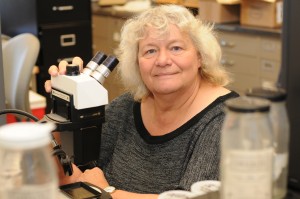NSF Supports Thomas’s Study on the Impact of Rapid Carbon Emissions on Global Climate

Ellen Thomas, the University Professor in the College of Integrative Sciences, received a grant in August from the National Science Foundation to support her research on “Evaluating Deep-Sea Ventilation and the Global Carbon Cycle during early Paleocene Hyperthemals.”
The $105,000 award is part of a combined $619,000 grant shared with Yale University and the University of Texas at Arlington.
Rapid, short-term global warming events in the Early Paleogene (~65-45 million years ago) were caused by massive greenhouse gas release into the ocean-atmosphere system. These warming events, called hyperthermals, had far-reaching effects on the evolution of life on Earth, ecosystems and the carbon cycle. The most extreme of these events was the Paleocene-Eocene Thermal Maximum (~55.5 million years ago). Hyperthermals resemble what could happen during anthropogenic climate change, and provide analogs for the effects of greenhouse gas emissions and their long-term effects on life on Earth.
By testing earth system interactions during the Paleogene hyperthermals, this interdisciplinary project will provide new insight into the impact of rapid carbon emissions on global climate—carbon cycle feedbacks and extremes in climate.
In this three-year collaborative project, new biotic, isotopic and trace element proxies will be integrated with existing data into a state-of-the-art, high-resolution, comprehensive earth system model to test the hypothesis that deep-sea ventilation released a massive amount of carbon from the refractory dissolved organic matter (DOM) pool during hyperthermal events, increasing atmospheric CO2 levels, thus amplifying climate change through carbon-cycle feedback.
“We will investigate the environmental response (e.g., ocean acidification and deoxygenation) and its impact on pelagic ecosystem structure for three Paleogene hyperthermals with different magnitude and duration,” Thomas explained. “The project will focus on a key mechanism involving remineralization of organic matter and oxidation of the DOM pool in the ocean, with potentially major implications for future climate evolution.”

